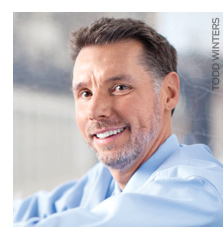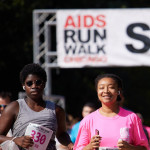What is AIDS United?
AIDS United is the result of a merger of the National AIDS Fund, AIDS Action and the AIDS Action Foundation, so it’s technically a merger of three organizations to create bigger bang for the buck.
 |
During these challenging economic and political times, we wanted to do more and do better. AIDS United brings together policy, advocacy, fund-raising and community capacity building all under one roof.
How will AIDS United determine its policy and advocacy agendas?
You can’t do good policy and advocacy work [on HIV] unless it’s informed by people who are living with and affected by the virus—the same people who benefit from those programs.
Our plan is to build [a network of] regional advocacy hubs across the country. The exact regions are to be determined, but we are going to be working with partners all over the United States to help build their capacity and to do grassroots organizing.
So much important work is happening at the local, state and regional levels that we realized it was key to expand our advocacy efforts beyond the nation’s capital. Our federal [advocacy] work will inform what we need to do at the state level; we’re addressing things such as state funding for AIDS Drug Assistance Programs [ADAPs], state and local funding for HIV prevention programs, and getting Medicaid expanded state-by-state for people living with HIV/AIDS until health care reform kicks in in 2014.
Will your work overlap with other groups?
This is certainly not about overlap. This is about working in partnership with local organizations to help them do what they do better. We will learn from what they are doing at the local level so that we can do better nationally.
It’s not about re-creating the wheel. I think of this as vertical integration of lots of good players and good programs and good institutions across the country. Our synergy has to be complementary; the last thing we need to do is do what anybody else is doing.
How is AIDS United funded, and how will it be funded in the future?
Our principal funding partners are the Elton John AIDS Foundation, Bristol-Myers Squibb and Johnson & Johnson. We got a grant from the federal government called the Social Innovation Fund of over $3 million a year for the next three to five years. We also have a combination of public and private funders.
AIDS United also will expand our individual donor base through a new event in DC called Team to End AIDS. It’s a marathon endurance-training event founded at the AIDS Foundation of Chicago then later launched in Los Angeles at the AIDS Project Los Angeles.
Team to End AIDS helps participants train for a marathon, a half marathon or a triathlon. This is really all about getting individuals involved in the fight against AIDS and getting their friends and family to support them.
Why marathons?
Running marathons is a passion of mine. I’ve been running to raise money for the AIDS Foundation of Chicago since 2003. I’ve done seven or eight marathons and almost as many half marathons. Last summer I did my first triathlon, the International Distance Triathlon in Chicago.
My partner and I have raised tens of thousands of dollars for the AIDS Foundation of Chicago and the fight against AIDS through these events. Team to End AIDS has trained thousands of people and brought tens of thousands of new donors to the fight.
Why did you leave the AIDS Foundation of Chicago (AFC) after 20 years of service?
It was the right time and the right opportunity to take my skills, experience and passion to the national level. It was just too good an opportunity to pass up. I’m honored to have been chosen to lead AIDS United.
AFC is a great place, and it’s now in the wonderful hands of David Munar, the new CEO. I worked closely with him for 19 of my 20 years at AFC, and he is absolutely ready to take on this big challenge.
What keeps you motivated?
This work has never been a vocation for me, it’s been an avocation. I feel blessed to wake up every morning and to be able to do what I do.
I still believe that the fight against AIDS is winnable, and I want to do it as long as I can. I want to be here for the finish. I didn’t know 20 years ago that this was going to be what has provided so much purpose in my life and so much direction.
As long as I am of value to the sector, as long as I believe that I am making a difference in the lives of people that are affected by AIDS, then I want to do this until I can’t do it anymore.
What works, and what doesn’t, in terms of AIDS advocacy?
For me, grassroots and grass-tops mobilization are so critical. We need a big tent. We want everybody that cares about AIDS and cares for people with AIDS [to get involved].
We also need to build coalitions beyond HIV, such as with the housing community, the substance abuse and mental health communities, the formerly incarcerated and people working in prisons. It’s about building bridges among all these groups.
All of these issues affect people with AIDS and affect people at risk for HIV, so it’s really figuring out those areas where there’s overlap and how we can help each other be successful. Our success in the fight against AIDS is predicated on our developing strong relationships outside of the AIDS sector.
Inside the AIDS sector, so many of us have different expertise. It’s figuring out what all of these great people doing wonderful work bring to the table and then supporting each other in these efforts. The more that we can talk in a united voice and the more that we can bring a united front to Capitol Hill, the more successful we are going to be.
Go to aidsunited.org for more information.






Comments
Comments